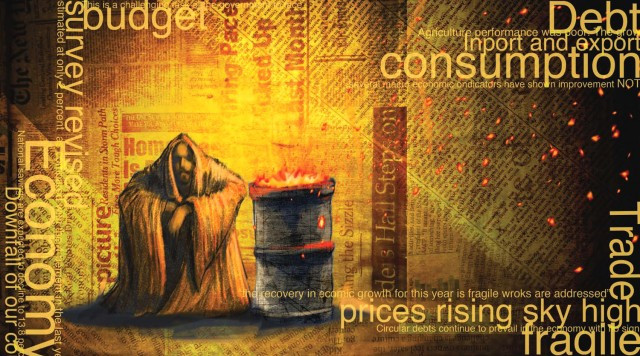A dismal outlook: the economic survey

The government has also been doing some ‘creative accounting’ to increase the country’s GDP growth rate, they have revised last year’s data in order to make this year’s data look more impressive by comparison. According to economists this is just ‘figure fudging’ and the preferred method of ensuring a higher growth for the current year is by reducing the growth of the previous year.
The Economic Survey revised the Gross Domestic Product of the two fiscal years from 2007 to 2009 and decreased it. The current Gross Domestic growth would be three per cent and not the high 4.1 per cent that the government forecasts if it were calculated using the last year’s two per cent GDP into account. The International Monetary Fund and Asian Development Bank forecast Pakistan’s domestic growth at below 3.5 per cent for the current fiscal year.
‘The government has acknowledged that cumulative effect of energy crisis on the economy is estimated at two per cent of Gross Domestic Product during 2009-10 as 1.7 per cent negative growth rate has been witnessed in electricity consumption,’ according to the survey.
Our rate of inflation is higher than other regional countries. They must understand that with this rate of inflation the country continues to still suffer from massive poverty, unemployment, hunger and disease.
Pakistan’s fiscal deficit has increased to 2.7 per cent of its GDP during the first half of the fiscal year, compared with 1.9 per cent in the same period last year.
This is expected to worsen due to lower than anticipated external aid from theCoalition Support Fund, the fiscal deficit during 2009-10 is anticipated to be around 5.1 per cent of GDP as compared to 4.9 per cent last year.
Fiscal deficit is a problem because the government starts borrowing money from the domestic credit market instead. The government borrowed Rs191 million from commercial banks in the first eight months of the fiscal year 2009-10.
The country’s agriculture performance was poor. The year’s agricultural growth decreased to two per cent from four per cent last year.
Agriculture was allocated a paltry of Rs10.87 billion; only 1.5 per cent of the Rs663 Public Sector Development Programme, despite agriculture being a vital sector that contributes a major portion to the country’s GDP and employment.
National savings are expected to decline to 13.8 per cent of GDP from the targeted figure of 14.7 per cent while the total investment is estimated to drop to 14.7 per cent. Foreign Direct Investment declined substantially in July- April 2009-10 to only 1.7 billion after reaching nearly $5 billion in 2007-08. If this trend continues to prevail the international donors will not come to the country’s aid and Pakistan will not have many options available for repaying external debt.
In a country where there is massive illiteracy and where some of the parliamentarians posses fake degrees and where the many ministers lack adequate qualification and experience the education sector is mostly ignored.
Pakistans’s public spending on education as a percentage of its GDP is one of the lowest in the region. It allocated two per cent of its GDP to spend on education in 2009-10 as compared to Bangladesh, India, Indonesia, Malaysia, Nepal, Thailand and Vietnam. These countries spent more of their GDP on education, with India allocating 3.3, Indonesia allocating 3.5, Iran 5.2, Malaysia 4.7, Nepal 3.2, Thailand 4.5 and Vietnam 5.3 per cent of GDP.
Pakistan external debt and liabilities increased by $2 billion during the first nine months of this fiscal year taking the total outstanding foreign loans to $54 billion by March 31. The government’s only option to deal with this problem will be the privatization of state assets with concessions to give foreign investors more incentive to buy.
‘The recovery in economic growth for this year is fragile and will remain so until weakness in the macroeconomic frame works are addressed,’ according to the Economic Survey for 2009 2010.
Published in the Express Tribune, June 14th, 2010.



1733130350-0/Untitled-design-(76)1733130350-0-208x130.webp)














COMMENTS
Comments are moderated and generally will be posted if they are on-topic and not abusive.
For more information, please see our Comments FAQ